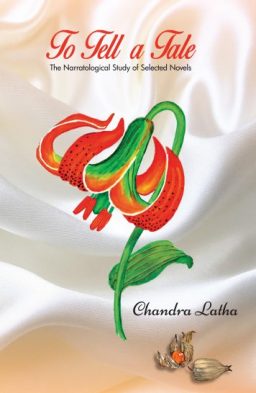
To tell a tale-25
(Chapter-7 Part-2)
-Chandra Latha
With appropriate expression of percept and concept, this novel achieves Sui generis. With the lofty narrative style to describe trivial things with a combination of classical rhetoric and simple colloquial prose, Puppets can be rightly called a mock epic novel that suits the definition of a novel as “a comic epic in prose” by Henry Fielding.
The novel reflects the popular psychological conditions and ideas. Most importantly, the psychosomatic effects on the characters in the process of interiorizing the external conflict is brilliantly portrayed. Symbolism in Puppets is quintessential, important and subtle for this novelistic narrative. The author expressed his intention to write this novel is to share the aesthetic experience. Through this didactic tale, the novelist emphasizes on the importance of individual autonomy as a necessary pre-requisite for the emergence of the whole man. And, very strongly cautions that a society will never progress unless its men and women learn to think independently and act according to the dictums of their conscience. And, this novel of ideas triggers the thought and provokes the action to deal with multifold challenges of the contemporary social realities. In the backdrop of the socio-political tumult of the post independent India, a heinous incident stirred a particular interior region of Andhra Pradesh that would have easily and silently slipped off into the folds of history. But, it created the compulsion of emergence of such a strong narrative like Puppets that stands up and testimonies as a social document that would have otherwise faded off into the caverns of history.
In Chapter-IV, The Shattered Glass: The Tin Drum, Günter Grass mingles fact and fiction brilliantly, assimilating different narrative techniques in the most unconventional method weaves a narrative matrix in his unique style of magic realism.
Magic realism in The Tin Drum is unique as it employs effective representation of symbolism, technological representation like photography gives the factual connection to the fantastic narrative achieved by methods of allegory and surrealism.
The incipit presents a narrator with an abnormal sensibility with an unreliable tone in an unusual set up. The covert narrative is both homo-diegetic and hetero-diegetic simultaneously. The figural narrative situation has an unreliable narrator and this novel is an open text.
The Tin Drum is the story of the narrator, Oskar Matzerath, an inmate of a mental asylum, whose memoir makes the novel. This novel triggers the German conscience in the most disturbing way, as the self-imposed dwarf-observes the world, people and life from what the Germans call the ‘frog’s-eye perspective’-with a comparison to art and war. The narrative nominates Oskar as the embodiment of Krystallnacht, the night of broken glass, which showcased the unmasked aggression of the Nazi party. And, Oskar evolves as a symbolic character with his clairvoyant powers to dismantle the retrogressive and violent Nazi party.
The Tin Drum achieves the visual impact of reality with the effective use of real photographs with a picture perfect analysis of the narrator Oskar. The choice of double narration, simultaneous presentation of both first and third person narratives (I, Oskar), makes the narrator an unreliable narrator. The simultaneous presentation of both subjective and objective perspectives makes the novel dialogically plural.
The liberal usage of hyperbole gives the novel to achieve the fantastic nature, and the unreliability. In this novel, not only the narrator, Oskar, but all other characters, events and incidents, give the novel the flavor of picaresque.
Grass knits his novel with history and fantastic. The conscious mixing of the narrative styles makes The Tin Drum a surrealistic text. It can be considered both modern and post–modern. The Tin Drum has traces of absurdity. This novel presents the Germany before, after and during the war in a grotesque manner. The minute details of the everyday Nazism are vividly described in the novel. Grass criticizes petite bourgeois who distance themselves from the reality by sitting on the concrete structures as of people from Mars and dream about comfortable home and refrigerators. Grass upholds the responsibility of the war crime. The Tin Drum can be considered the narrative of guilt. Germans are left with no choice, but to face the guilt and live with the burden of the guilt.
The Tin Drum is significant Bildungsroman (coming of age or the growing up) novel which evolved through German folktales. Oskar is created like a demi-god who could survive and challenge the Nazis with his wits, his talents like the Drum beat and the shrieking voice that can shatter glass. The constant shift of narrative times and the most unreliable narrator with picaresque nature breaks open the social reality. The narrator relates naturally as if narrating to a co-passenger in a strange land without any great expectations to impress. With this simple, casual and uncomplicated narration, the earthiness in language and shattering narrative style drums out the historical reality in an original tone making Grass a remarkable writer. And, The Tin Drum the most influential novel in world literature.
In Chapter-V, To Tell a Tale: One Hundred Years of Solitude, Gabriel García Márquez’s magic realism is something diagonally opposite to the traditional naturalistic fiction, intermingles the fact with fantastic to the epic standards.
In this vibrantly diverting comic novel, exists a great deal of violence, cruelty, and despair under delightful narrative in which the characters are immersed in the central ingredient, solitude.
The working of two senses of time, linear and circular and the interplay between these two senses creates the most salient historic developments of the town and the most important effects of the novel. The men are characterized by an obsessive repetitiveness of their lives. Marquez retains the narrative skills of folklore of oral narration, which is the basic narrative scheme of this book.
Certain narrative features are quite unique to One Hundred years of Solitude. The story foretold, the multi-fold narrative in the voice of entire town which evolves as the tone of the novel, meta narrative, make-believe incidents, vivid usage of adjectives, widespread use of beliefs, superstitions, myths, premonition, intuitions and “pava”, figurative rhetoric filled with rich idiomatic phrases, exploitation of hyperbole and undertone are few to mention. These carefully adopted narrative techniques enable the narrative to achieve the deep rooted native identity while the narration pretends seriously innocent. The inherent ability to visualize and foretell the future , no way help them to prepare for themselves to struggle for existence but, they withdraw into self driven solitude which enables everything to happen exactly the way they foretold.
Throughout the novel everything is foretold. The narrative becomes more complex, interesting and challenging to the amused reader to evolve through the novel as the foretold story unfolds with great surprises and unexpected events leaving the reader in suspense and expectation.
*****
(Contd..)

Chandra Latha, writer from Nellore won Telugu Association of North America award in 1997 for the novel “Regadi vittulu”. Her other novels are Vardhani(1995) and Vallu veellu paarijaataalu (2011). Her short fiction includes nearly 80 stories compiled in nenu nanna navutha (1996),Idam shareeram (2003) and vivarnam(2007). Her non-fiction are (Fish can fly!) ”vacche daretu(2010), itanala kadaku eeboothi boTlu(2010). And also published her blogposts in a book madata pejee(2010).
